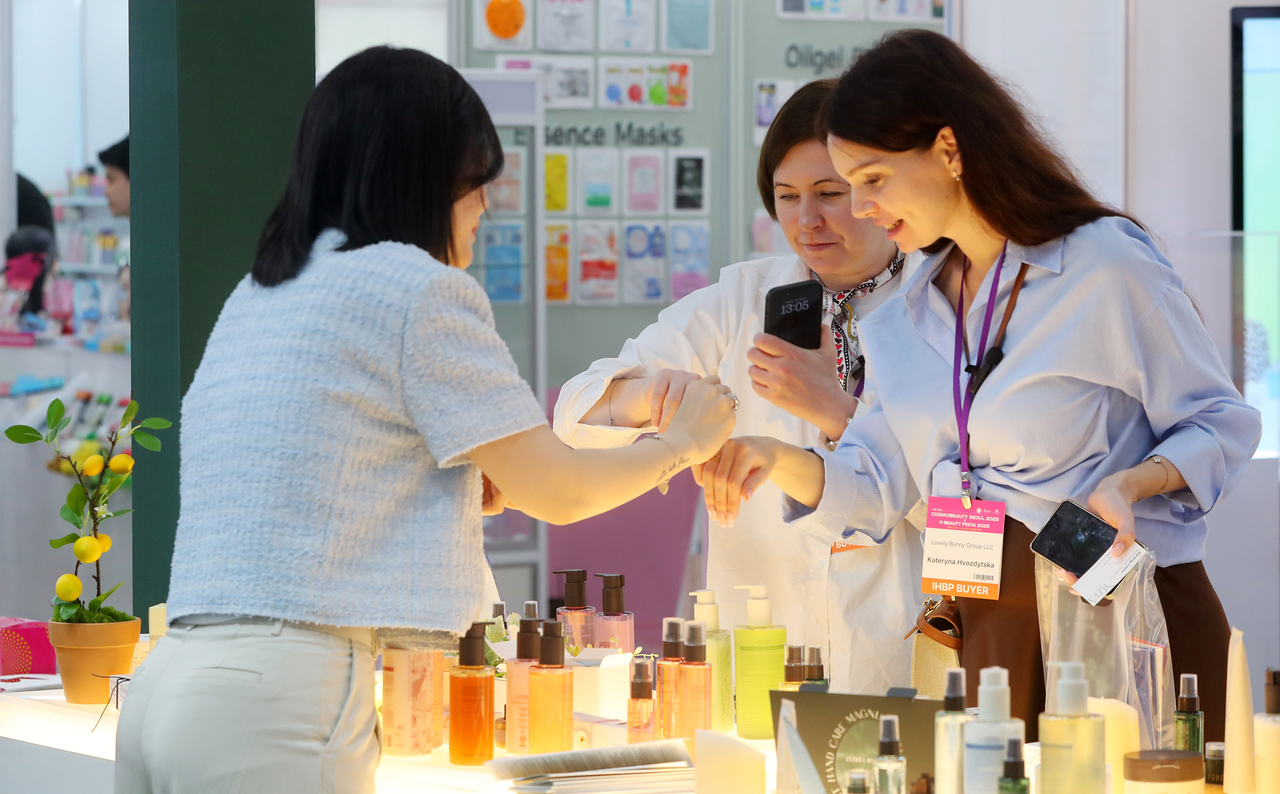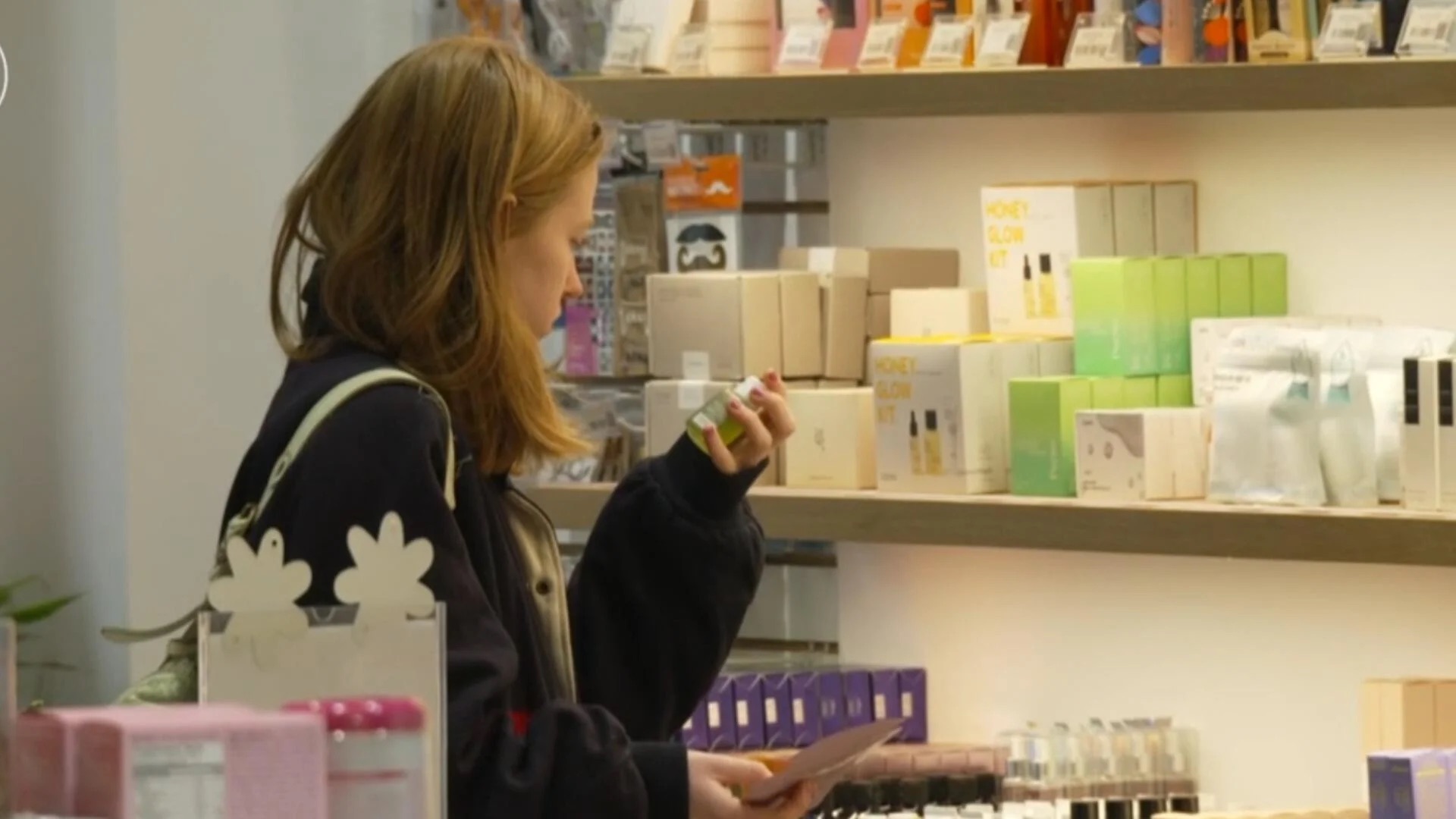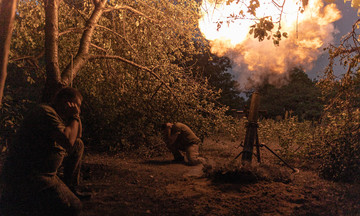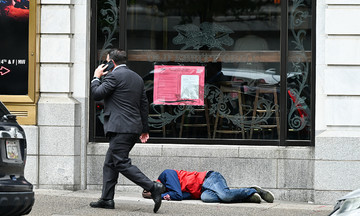The threat of a 25% tariff on South Korean imports spurred Esther Lee, a Los Angeles marketing executive, into action. She and her husband immediately went online and bought enough eyeliner and sunscreen to last a year, spending hundreds of USD – three times their usual amount.
The Lees are among many Americans who love Korean makeup and skincare products. They rushed to stockpile their favorite East Asian beauty items before the potential tariffs take effect and drive up prices.
"The future is unknown, but one thing I do know is that I am not willing to give up some of my Korean skincare products," said Taylor Bosman Teague, a TikToker with over half a million followers, in May, while showcasing her recent toner and moisturizer haul.
 |
Customers try out cosmetics at a Korean beauty products fair at Coex in southern Seoul in May. Photo: Korea Herald |
Customers try out cosmetics at a Korean beauty products fair at Coex in southern Seoul in May. Photo: Korea Herald
The Korean cosmetics stockpiling craze began in April when President Donald Trump announced sweeping tariffs on several trading partners, including South Korea. He later suspended the tariffs to allow for negotiations.
However, earlier this month, Trump sent letters to over a dozen trading partners, threatening new tariffs from 1/8 if agreements weren't reached. South Korea was among the countries facing a potential 25% tariff.
Seoul quickly dispatched its top trade negotiator, Yeo Han-koo, to Washington to meet with US Trade Representative Jamieson Greer. However, Yeo returned without a breakthrough.
"We are doing our best to produce a mutually beneficial outcome, but we haven't been able to pinpoint exactly what each side wants," said President Lee Jae-myung.
Rob Handfield, a professor of supply chain management at North Carolina State University, acknowledged that many Americans are stockpiling goods before the potential tariffs hit. He stated that it's unlikely South Korea will reach a trade agreement with the US before the 1/8 deadline.
Trump's renewed threats have further fueled South Korea's already booming cosmetics export industry. South Korea’s Ministry of Food and Drug Safety reported that cosmetics exports reached a record 5.5 billion USD in the first half of this year, up almost 15% from the same period in 2024.
Amorepacific, South Korea’s largest cosmetics company, reported a 40% increase in overseas sales in the past year.
Liah Yoo, a 36-year-old content creator and founder of the US-based cosmetics brand KraveBeauty, said the tariffs would significantly impact the entire beauty industry. KraveBeauty’s products are all manufactured in South Korea.
The long-standing free trade agreement between the two countries has exempted cosmetics from tariffs. One of the biggest advantages of Korean beauty products has been their affordability, according to Yoo. Consequently, Korean brands that rely on competitive pricing would be severely affected by the new tariffs.
Many Korean beauty product enthusiasts say the products are often gentler and less irritating than American brands. The attractive packaging and endorsements by numerous Korean celebrities also add to their appeal.
 |
Customers browse beauty products in Brooklyn, New York, USA. Photo: CBS News |
Customers browse beauty products in Brooklyn, New York, USA. Photo: CBS News
Lee said Korean products make up about 80% of her current makeup and skincare routine. She added that if prices rise due to the tariffs, she would buy in bulk during trips to South Korea or ask friends to purchase them while traveling there.
Many American consumers even said they would remain loyal to their favorite Korean brands even if they become more expensive.
Sophie He, a 27-year-old American student studying Korean at Yonsei University in Seoul, said all her makeup is from Korean brands. She plans to stockpile several months' worth of moisturizer and serum for herself and her friends before returning home.
She became interested in Korean cosmetics in middle school after seeing social media influencers using them. She found that the Korean products suited her skin.
Dermatologist Christine Hall explained that Korean skincare focuses on maintaining hydration and a healthy skin barrier, resulting in brighter, more radiant skin.
At a branch of the Korean cosmetics store chain Olive Young, He pointed to dozens of products and could readily recite their functions and ingredients. He said that when her stockpile runs out, she won't hesitate to buy more products sold in the US, even at higher prices.
"To me, they're worth it," she said.
Thuy Lam (According to AP, Reuters, DC News Now)












